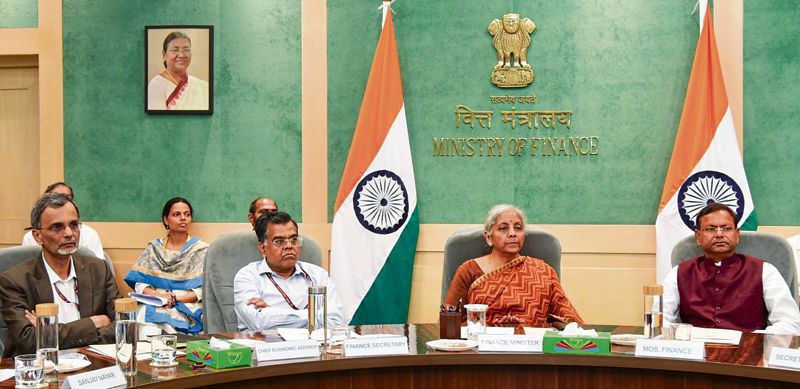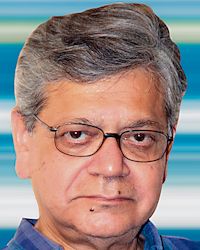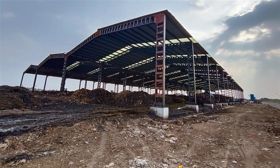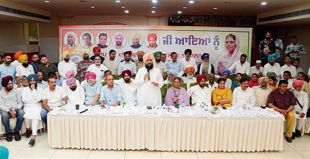
Dialogue: The Union Government has been holding pre-Budget consultations with various stakeholders. PTI
Senior Economic Analyst
THE Union Government is considering what it has not done for over half a dozen years now. In the full Budget for 2024-25 due in late July, it may end up cutting taxes amounting to Rs 50,000 crore so that those not so well-off can get to pay less by way of taxes and consequently spend more by way of raising consumption.
One way of doing this is introducing a new beneficial income tax slab. Another step can be raising grants for small farmers as well as allocating more government funds for the rural employment programme, which will help both male and female rural workers.
The overall picture is that even as the GDP has been doing well over the last few years, private consumption has not kept pace. After the Covid-19 pandemic subsided, the GDP growth rate hovered at around 8 per cent till 2023-24. But private consumption, after growing through state largesse at the rate of over 10 per cent in 2021-22, slumped to around half that figure in 2023-24.
But for the Budget as a whole, the government needs to do much more than just lower a few taxes. According to an expert, around 20 million more jobs will be needed. The Budget can help take things forward in four ways. As there are fewer jobs available in rural areas, there will have to be well-planned, sustainable cities with enough jobs to absorb the people coming in from villages in search of work.
The Budget will also have to help boost large-scale manufacturing. The key will be more funds by way of the production-linked incentive scheme, which encourages global companies to bring in manufacturing plants that both create more skilled jobs and use the higher production for domestic consumption as well as exports. Additionally, information technology companies will create new jobs for engineers and fetch services exports. These engineers will spend and contribute to indirect taxes.
Some of these points have been raised by business representatives in their meeting with the Finance Minister while offering ideas on putting together the forthcoming Budget. A somewhat new proposal will be to raise capital expenditure in rural areas so that there is more irrigation, warehousing and cold chains. This will raise agricultural output and bring down inflation, thus allowing the economy to go further through greater government expenditure without pushing up inflation.
As much as the corporate leaders have their focus on their own businesses, they have also shared ideas with the government to focus on micro, small and medium enterprises (MSMEs). These will feed into the larger businesses and help them grow further.
Though the government has had some good ideas (cutting a bit of taxes) and the corporates have passed on a few more, it needs to focus on a cardinal reality that is yet to be addressed — the stark economic inequality in the country.
Even though India’s stock markets remain one of the costliest in the world, the government finds that it needs to keep delivering free foodgrains to 800 million of the 1.4 billion people in the country to keep hunger at bay. According to a survey by Reuters, economists feel that the youth, who are already suffering from unemployment, are not optimistic about things getting any better in the next five years.
Economists do not feel that there is any policy objective among decision-makers to reduce economic inequality. And a critical point for some of them is that inequality will not go away on its own through overall rapid economic growth, which is happening right now.
However, some experts feel that inequality in itself is not a cause for concern. What is important is that those at the bottom of the pyramid should fare better economically. Those at the top doing much better is not an issue.
The sharp differences among economists is highlighted by certain contradictions. India has the second-highest number of billionaires in Asia, while tens of millions of people scrape by with a daily wage of around Rs 400 earned through digging wells and country roads, making money 100 days a year.
Some economists, with the upcoming Budget in mind, feel that the key concern should not be to visualise the country becoming a developed economy by 2047 or in around a quarter century. What is more important is for workers to have better skills so that they have more jobs and become a part of an overall inclusive growth.
Ninety per cent of the economists polled felt that unemployment would remain the biggest problem for the next five years. The way to solve this would be to move from farm to factory. But what stands in the way is the failure to invest adequately in education. The country spends 3 per cent of the GDP on public education, even though the National Education Policy recommends 6 per cent.
In view of all this, it is perhaps necessary for both the government and business leaders to move away from issues regarding marginal changes in taxes and investments. Instead, it is imperative to focus on what matters so that the country has workers who are able to run more modern factories. The share of manufacturing in the GDP has remained in the range of 15-17 per cent for about 30 years.
If there is a saving grace, it is the rise in services delivering information technology, led by top software companies. The key policy that made it possible was the creation of software technology parks in the early 1990s and the waiver of income tax on IT export earnings. Right now, the US is the leading enabler of Indian exports, led by the delivery of services.
The government will be shortsighted if it tries to overcome the setback in the recent elections by looking at standalone decisions like reducing a bit of tax here or there. The 2024-25 Budget needs to have a broad goal, which the government of the early 1990s did. The way to begin today is to reform the public education system, aided by greater government spending.
Join Whatsapp Channel of The Tribune for latest updates.




























